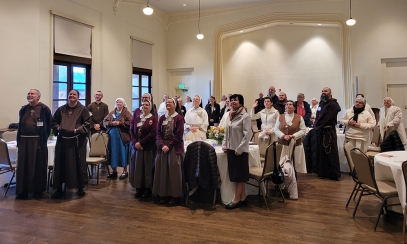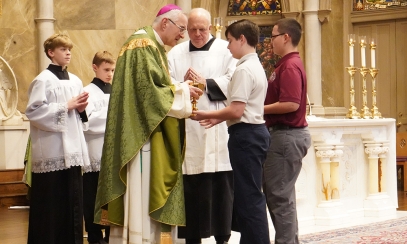
Love, sacrifice, and human dignity
The bedrock of almsgiving
The bedrock of almsgiving
My sisters and brothers, beginning our Lenten season, we are reminded annually of the simple and straightforward three-fold program of reform given to us in our Ash Wednesday readings: prayer, fasting, and almsgiving.
My sisters and brothers, beginning our Lenten season, we are reminded annually of the simple and straightforward three-fold program of reform given to us in our Ash Wednesday readings: prayer, fasting, and almsgiving.
This year, allow me to dwell on the aspect of almsgiving which we know as a part of our charitable works. All of our parishes and institutions have engaged in some form of charitable giving. We have shared our resources with our Centers of Concern, our St. Vincent de Paul conferences who serve the poor in our parishes, our local food banks, our giving tree at Christmas, and a wide array of other charitable drives that help support those who are trying to get through difficult moments in their lives. We do it because this is who we are, blessed by God, sharing our resources to make sure that no one is lost along the way. In part, it is because we recognize that together we are part of one human family — brothers and sisters all.
To be sure, almsgiving, a cornerstone of Lenten practices, holds a pride of place in the Christian tradition. As we believers embark on a journey of personal renewal during Lent, the act of giving alms takes center stage. In this article, we will explore three distinct and unique aspects of almsgiving, drawing insights from the teachings of Pope Francis, Pope Benedict, and Mother Teresa.
Almsgiving as a gesture of love and solidarity
Pope Francis, known for his emphasis on compassion and outreach to the marginalized, beautifully encapsulates the essence of almsgiving as an expression of love and solidarity. In his apostolic exhortation, Evangelii Gaudium, he states, "To love God and neighbor is not something abstract, but profoundly concrete: it means seeing in every person the face of the Lord to be served, to serve Him concretely."
Almsgiving, in this context, transcends mere charity: it becomes a tangible manifestation of love for one's neighbor. Lent becomes a transformative period where Christians actively engage with the suffering of others, recognizing the divine presence in those they assist. As Pope Francis notes, almsgiving is not just about giving material resources; it is a profound act of recognizing and serving Christ in those in need.
The interior transformation through sacrificial giving
Pope Benedict XVI, in his encyclical Caritas in Veritate, delves into the idea of almsgiving as a means of interior transformation. He emphasizes that true almsgiving involves sacrifice and self-giving. "Love — caritas — is an extraordinary force that leads people to opt for courageous and generous engagement in the field of justice and peace," he writes.
During Lent, Christians are called not only to give from their surplus but to make genuine sacrifices for the well-being of others. This sacrificial dimension of almsgiving extends beyond financial contributions, our treasure, generously embracing the sharing of time, talent, and attention. We are invited to reflect seriously on our own attachments to material possessions and the willingness to part with them for the greater common good.
Almsgiving as a response to human dignity
St. Teresa of Calcutta, a paragon of selfless service, provides insights into almsgiving as a response to the inherent dignity of every human being. She devoted her life to serving the poorest of the poor, embodying the Christian call to recognize the face of Christ in each person. In her words, "Not all of us can do great things, but we can do small things with great love."
Mother Teresa believed almsgiving is not contingent on the magnitude of the gesture but on the sincerity and love with which it is offered. It is about recognizing the dignity of the recipient and responding with compassion. Lent, as a season of reflection and renewal, provides an opportune moment for us Christians to reevaluate our perspectives on our neighbors in need and the sharing of our resources. Almsgiving, in this sense, is a practical affirmation of the belief that every person is created in the image of God and reveals to us the spark of the divine in this noble gesture.
In conclusion, almsgiving during Lent is a multifaceted practice that encompasses love, sacrifice, and a profound acknowledgment of human dignity. Pope Francis, Pope Benedict, and St. Teresa of Calcutta, each in their unique way, contribute valuable insights to enrich our understanding of this transformative act. As we Christians engage in almsgiving, we partake in a journey of personal renewal that extends beyond the season of Lent, fostering a lifelong commitment to love, sacrifice, and the dignified service of those in need. A blessed Lenten journey to all!
The Most Reverend Steven J. Raica is the Fifth Bishop of Birmingham in Alabama



